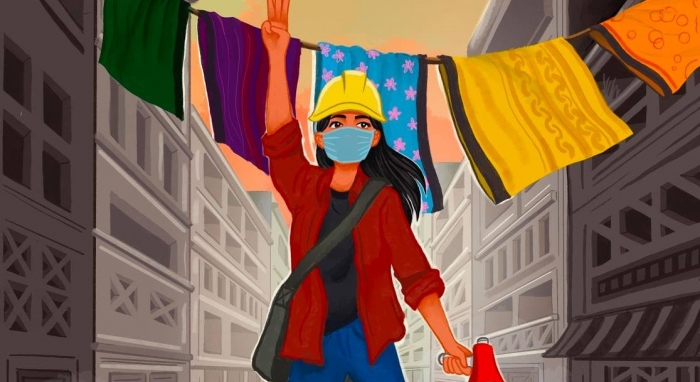Since the military coup d’état last month, the people of Myanmar have taken to the streets throughout the country to demand the restoration of the democratically elected government and of fundamental rights and freedoms. Their peaceful and nonviolent protests have been met by increased brutality – and, according to an OHCHR statement on 16 March, the killing of nearly 150 civilians. While the future of Myanmar will be determined by its people, the international community must stand with them.
Learn more, and find ways to help support Myanmar’s people in their struggle, by going to www.isupportmyanmar.com
Artists are also showing their support to the movement; see our cover artist Yee Mon Oo and more at www.yangon.design
On 11 March, the Special Rapporteur on Myanmar, Thomas Andrews, presented his annual report to the Human Rights Council. In line with his existing mandate and the Council’s February 2021 Special Session resolution, he documented numerous cases of murders, disproportionate use of force, torture, mass arbitrary detentions and intimidations, in response to the people of Myanmar’s peaceful and non-violent protests. He also expressed concern at the ‘systematic repression of civil and political rights’, as the junta has issued draconian decrees to suppress freedom of expression, peaceful assembly and association, as well as the right to privacy and access to information.
In the dialogue that followed, nearly all interventions shared concerns about the military’s use of excessive force against civilians and demanded the immediate and unconditional release of all arbitrarily detained people, including State Counsellor Aung San Suu Kyi and President Win Myint. Delegates from the EU, Pakistan, Malaysia, Saudi Arabia and others put the accent on the ongoing crimes against minorities, particularly the Rohingya. The EU, the UK, the US and others pointed out the need for effective accountability mechanisms, calling for enhanced cooperation and concerted action from the international community.
In response to appeals for coordinated action from member States, delegates from China, the Russian Federation, and Venezuela declared that choosing to follow the deterioration of the situation in Myanmar from a human rights perspective is the result of self-interest and political considerations. In criticising the Special Rapporteur’s report and the conclusions therein, the delegates asserted that imposing a ‘politicised’ mandate over the situation in Myanmar undermines the principles of non-interference and ‘neutrality’ and insisted that it violates Myanmar’s sovereignty. This is despite the fact that both the UN Charter and the Universal Declaration of Human Rights make clear that human rights are universal, inalienable and that all States have an interest and responsibility to promote and protect them for all people everywhere.
Sarah M Brooks, ISHR Programme Director, notes that such statements undercutting the work of Council experts are deeply problematic. ‘Even in the face of the killings of nearly 150 peaceful protestors and the escalation of state violence, these governments are apparently unable to reconcile their positions with the responsibilities of Council membership’.
Myanmar strongly rejected the Special Rapporteur’s mandate, claiming that it contravenes ‘the principles of universality, impartiality, objectivity, non-selectivity and non-politicisation in addressing the human rights situation of the country concerned’.
As the Special Rapporteur emphatically stated, ‘The junta is asking this body and the world to disbelieve our own eyes’.
In his report, the Special Rapporteur urged the military junta to permanently end the persecution of journalists, human rights defenders and others who legitimately exercise their rights to freedom of expression and peaceful assembly or association. He also appealed to countries and international organisations to take steps to pressure the junta and its economic interests, adding that sanctions be tailored to ensure minimum impact on the people of Myanmar. Furthermore, the report underscored the conclusions of the Independent International Fact-Finding Mission on Myanmar, according to which carrying out business with the military, or any enterprise owned by them, is inconsistent with the protection and promotion of human rights.
ISHR has emphasised before that global companies operating in Myanmar have a responsibility to promote human rights and assess the human rights risks associated with their operations. Engaging in business activities with those that coordinate the repression of civic freedoms and human rights is, according to Programme Manager Andrés Zaragoza, ‘simply unacceptable’.
Persistent impunity in Myanmar – including and especially for its military leaders – has created the preconditions for the current crisis. The Special Rapporteur’s report concluded by underlining the need for strengthened accountability mechanisms and full cooperation with the UN human rights mechanisms, as well as with the International Court of Justice and other justice initiatives to address allegations of gross violations of international human rights and humanitarian law. And finally, the report recommended member States to deny recognition of the military junta as the legitimate government representing the people of Myanmar.
The brutality that has been unleashed by the Myanmar military represents an assault on an emerging democratic system and on the people that have courageously fought for it for decades. As the Special Rapporteur stressed, speaking out against the coup and the brutality associated with it is an important first step, but it is not enough.
Says Brooks, ‘Passing a strong resolution, and ensuring that increased monitoring and efforts for accountability are in place, is the Council’s duty – to its own mandate, and most importantly, to the people of Myanmar who have risen up and inspired the world with their courage’.
‘The reluctance of a few nations to act should not prohibit or limit any coordinated action at all’, highlighted the Special Rapporteur. This time, the international community must act together as a coalition of nations, and ensure that those responsible for human rights violations in Myanmar are held accountable.




